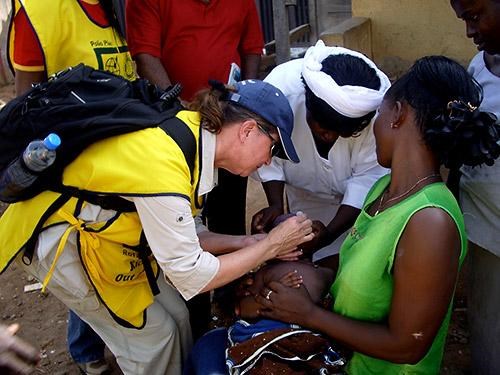News that July 24, 2014 was Nigeria’s last reported case of wild poliovirus was a thrill for Powell River Rotarian Jan Gisborne.
A polio survivor herself, Gisborne travelled to Nigeria in 2007 to participate in a National Immunization Day.
“The country has made so much progress since then,” she told the Peak this week. “They are winning the battle against polio because the government became involved. That was also true in India. Without enthusiastic support from the local governments we will not be able to eradicate polio.”
Accurate maps of Nigeria did not exist in 2007. “Getting the government on side was crucial to getting the military to do aerial surveillance and map all the villages,” said Gisborne. “You can’t immunize children if you can’t find them.”
The Nigerian government became more involved with its own health care workers and partnered to make the best use of technology.
“It was this coordinated organization of all interested parties that enabled Nigeria to react so quickly and effectively in the Ebola outbreak last year,” said Gisborne.
Final laboratory results on all specimens from acute flaccid paralysis cases and environmental samples for the full 12-months period in Nigeria are expected by September 2015, which, if clear for poliovirus, may lead to Nigeria being removed from the list of polio-endemic countries, a list which includes Pakistan and Afghanistan. So far this year there have been 28 cases in Pakistan and 6 in Afghanistan.
Gisborne also participated in a NID in India in 2004.
That country was declared polio-free in March 2014.
“As long as the virus is anywhere in the world, with so much air travel today, it can find its way to Canada,” said Gisborne.
She remembers when elementary schoolmates were taken from her classroom to receive polio immunization drops, that she did not have to go. She stayed behind with “kids with braces and crutches.”
It was during the 1950s and Gisborne didn’t completely understand what was happening. In August of 1953, the height of the polio epidemic in Canada, there were 797 cases of polio recorded in BC. One of them was 18-month-old Gisborne. She bears no symptoms from polio, unlike others who ended up in an iron lung or with braces as a result of the disease. “Although my baby fingers are very short which doctors thought might be from polio.”
The last major epidemic in Canada occurred in 1959 when there were 190,000 poliovirus infections. Of that 1,887 cases resulted in paralysis. Former Prime Minister Jean Chrétien contracted polio as a child. It affected his mouth and caused him to lose hearing in one year. Other Canadians who had polio include singer Joni Mitchell, Haida artist Bill Reid, actor Donald Sutherland and rocker Neil Young.
Since 1985, Rotarians around the world have contributed millions of dollars and volunteer hours to eradicate the disease that cripples young children.
“We want to do to polio what was done with small pox,” Gisborne said.



